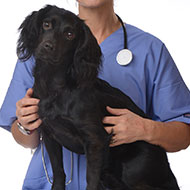New insights into ionised hypercalcaemia

"This study reveals the true importance of doing an ionised calcium measurement when evaluating calcaemic status."
Relying on calcium concentrations alone to diagnose dogs with ionised hypercalcaemia could lead to misclassification in approximately one-third of dogs, according to new research.
In the study, scientists at the University of Edinburgh first established a normal reference interval for ionised calcium, total calcium and albumin, serum and plasma biochemistry from samples of 351 healthy adult dogs.
Next, they searched the laboratory’s database for adult dogs with ionised hypercalcaemia that had attended the University's Hospital for Small Animals between 2012 and 2017 - a time when researchers were using the same sample handling protocols and instrumentation.
Lastly, the team searched the hospital records for patient information and analysed the biochemical parameters. They found that, of 63 dogs identified with ionised l hypercalcaemia, 23 did not have a total hypercalcaemia (37 per cent), and from these 16 dogs, 23 (70 per cent) had albumin within the reference interval.
Summarising their findings in the Journal of Small Animal Practice, researchers conclude that, using total calcium, one-third of patients with ionised hypercalcaemia were not identified. There was also no significant relationship between albumin and total calcium in these cases.
“Hypercalcaemia is a very important clinical abnormality, often revealing severe underlying disease in dogs who do not get idiopathic hypercalcaemia,” commented lead author Camilla Tørnqvist-Johnsen. “This study reveals the true importance of doing an ionised calcium measurement when evaluating calcaemic status.”
Nick Jeffery, editor of JSAP added: “This study demonstrates that, if relying on total calcium alone, more than one-third of dogs with ionised hypercalcaemia will be classified as normocalcaemic. Furthermore, the study demonstrates that the discordance between ionised and total calcium cannot be routinely explained by a low protein-bound component.
“Whilst reference intervals are key in clinical practice to determine whether a result is an outlier from 95 per cent of a healthy population, it is not inevitable that a patient with an outlying biochemical test result has a clinically relevant disease.”



 The Veterinary Medicines Directorate (VMD) is inviting applications from veterinary students to attend a one-week extramural studies (EMS) placement in July 2026.
The Veterinary Medicines Directorate (VMD) is inviting applications from veterinary students to attend a one-week extramural studies (EMS) placement in July 2026.